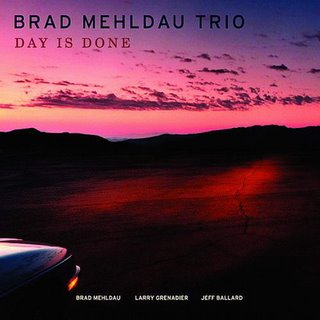
The Bop guys had no problem in plundering contemporary popular music for source material, so it's a mystery why many players keep on rehashing the same old stuff in the 21st century. I mean, bop happened 60 years ago - a lot of water has gone under the bridge since then, including the whole rock era - so why is it still odd for a mainstream jazz artist to dip their toe into music written after 1950?
That might be a bit of an exaggeration, but it's certainly a thought that comes to mind when listening to 'Knives Out', the opening track on this, pianist Brad Mehldau's 13th album. Released in 2005, the album is one his most energetic, as evidenced by the opener. In the hands of Radiohead it was yet another piece of minor-chord introspection, but the unusual chord structures make a fine vehicle for solo improvisation. The tension in the harmonic structure of the piece is palpable from the off. Mehldau plays it pretty straight to begin with (if that is possible) before shattering preconceptions in a sustained and intense bout of soloing that lasts for most of the track's 8 1/2 minute length.
It's a hard act to follow - the highlight of the album in many ways - but there is much to enjoy later on. The two Lennon-McCartney compositions come off well - 'Martha My Dear' is pretty much dismantled and put back together again in a virtuoso solo piano performance, while 'She's Leaving Home' is pleasant enough, in keeping with the original's wistful mood. Paul Simon's 'Fifty Ways To Leave Your Lover' also gets the dismantling treatment, though this time it's a group effort with Meldhau and the rhythm section sparring on the theme for much of the piece.
Jeff Ballard on drums is worth a mention. His playing is satisfyingly complex, driving and polyrhtymic at the same time. It's a particular joy to hear him playing quietly, tapping out ever-changing rhythms on the hi-hat, or gently using brushes. He doesn't get a lot of solo space, but all that needs be done is to focus on his playing at any point to hear his improvisational qualities.


